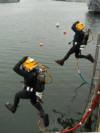|
|

|
I fly small aircraft and dive also. I would fly to your destination, do your dives and stay for 12 hours minimum. There are many people who dive then travel up mountains 1,000 + feet and are fine. There are also people who get bent following the tables very conservatively. I personally wouldn’t risk testing MY body as pilot in command after diving. I hardly fly and dive anyway because the weight of the gear is too great for a Cessna Skyhawk or similar aircraft. Keep in mind if anything happens you’ll most likely lose your medical at the least or pass out and crash at the worst.
|
|

|
Dutch - 6/01/2012 11:42 AM 
There are a few books on altitude diving. If you intend to dive and fly, you should look at these books and consider their procedures and dive planning. But in general, I think you are plain nuts. When the guys who develop tables say they wait 24 hours, then I am not going to second guess them. I have plenty of time for diving another time...
|
|

|
I appreciate all of the feedback. I wanted to understand at what point altitude started to have an impact on a person after diving. Specifically if it was a small non-presurized cabin. Based on the feedback I have received I now realize that it would not be a good idea to combine both hobbys. Thank you all for taking the time to respond.
|
|

|
The amount/type of diving you do has a direct impact on your flying limitations immediately after the dive. There is no set time frame for flying after diving, and no fine line either. For example, if you do 4 dives in one day, each of them being deep dives to about 100ft or so, at about 20-30 mins each time, then by the end of the day you will be pretty loaded up on nitrogen. In that case you wouldn’t want to fly at all for 12-24 hours. On the other hand, if you do 1 dive to a mere 15-20 feet, for only 15-20 mins, then you are probably pretty safe to fly within a couple hours. Point being, the effects that going to high altitude after diving has on your body are a direct result of the type of diving you do, as well as, of course, your physical conditioning, and how well your body itself handles the nitrogen at high altitude (as has been said, everyone’s different). I myself, for my body type, have found that if I follow the no-fly times on my computer I am perfectly fine (my computer is relatively aggressive and I’ve been fine). I’m in very good shape and have never had an issue. Diving with nitrox helps to not load you as much on nitrogen as well. For the record, I dove regularly for a year while living in an area such that I had to drive over a 1,200 foot mountain pass to get down to/from the ocean/my house and never had an issue. I think we would all agree here that the best thing to do, to play it safe is to follow tables and stay within your limits, since there is no hard line rule for when you should/shouldn’t fly.
So all in all, your idea of flying from dive site to dive site sounds fun! Maybe couple it in with some overnight camping at the first site to bleed off some nitrogen before flying to the next site?
|
|

|
I was taught that 2500 feet altitude is about the point most divers would be out of post dive safety zone. BTW, your body doesn’t know whether you are at altitude flying in a plane or driving over a mountain in a car.
|
|
|
|

|
pilots can get altitude DCS even when they havent been diving. sure its far and few between and usually fighter pilots making rapid ascents in their jets, but if you can get it without diving, its better to error on the side of safety if you have been diving.
|
|